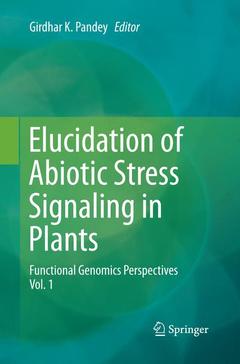Elucidation of Abiotic Stress Signaling in Plants, Softcover reprint of the original 1st ed. 2015 Functional Genomics Perspectives, Volume 1
Coordonnateur : Pandey Girdhar K.

Section 1: Functional Genomics approaches in signal transduction
Chapter1: Towards understanding abiotic stress signaling in plants: convergence of genomics, transcriptomics, proteomics and metabolomics approaches
Praveen Soni, Kamlesh Kant Nutan, Neelam Soda, Ramsong C Nongpiur, Suchismita Roy, Sneh L Singla-Pareek and Ashwani Pareek
Chapter 2: Molecular approaches in deciphering abiotic stress signaling mechanisms in plants
Swati Singh, Nisha Khatri, Arpana Katiyar and Yashwanti Mudgil
Chapter 3: Investigation of plant abiotic stress tolerance by proteomics and phosphoproteomics
Maik Böhmer
Section 2: Components of Signal Transduction
Chapter4: Role of cation/proton exchangers in abiotic stress signaling and stress tolerance in plants
Peter D. Bickerton and Jon K. Pittman
Chapter 5: Decrypting Calcium Signaling in Plants: The Kinase Way
Swatismita Dhar Ray
Chapter 6: CBL-mediated calcium signaling pathways in higher plants
Joo Hyuk Cho and Kyung-Nam Kim
Chapter 7: Redox regulated mechanisms: Implications for enhancing plant stress tolerance and crop yield
Ashish Kumar Srivastava, Penna Suprasanna
Chapter 8: Role of Mitogen activated Protein Kinase Cascade in Combating Abiotic Stress in Plants
Hussain Ara and Alok Krishna Sinha
Chapter 9: Small and large G proteins in biotic and abiotic stress response
Amita Pandey, Manisha Sharma, Girdhar K. Pandey
Chapter 10: ABA Receptors: Prospects for Enhancing Biotic and Abiotic Stress Tolerance of Crops
Monika Dalaland Viswanathan Chinnusamy
Chapter 11: Emerging Roles of Auxin in Abiotic Stress Responses
Eshan Sharma, Raghvendra Sharma, Pratikshya Borah, Mukesh Jain andJitendra P. Khurana
Chapter 12: Biotic and Abiotic Stress Signaling Mediated by Salicylic Acid
Dhirendra Kumar, Danda Chapagai, Phillip Dean, Mackenzie Davenport
Chapter 13: Methylglyoxal, Triose phosphate isomerase and Glyoxalase pathway: Implications in abiotic stress and signaling in plants
Charanpreet Kaur, Shweta Sharma, Sneh Lata Singla-Pareek, Sudhir Kumar Sopory
Chapter 14: Plant immunophilins: A protein family with diverse functions beyond protein folding activity
Aigen Fu
Section 3- Gene expression regulation of stress signaling
Chapter 15: Role of Plant Mediator Complex in Stress Response
Subhasis Samanta, Jitendra Kumar Thakur
Chapter 16: Towards understanding the transcriptional control of abiotic stress tolerance mechanisms in food legumes
Rebecca Ford, Saleem Khan and Nitin Mantri
Chapter 17: Insights into the small RNA mediated networks in response to abiotic stress in plants
Sonia C. Balyan, Roseeta D. Mutum, Shivani Kansal, Santosh Kumar, Saloni Mathur and Saurabh Raghuvanshi
Chapter 18: The Role of Long Non-coding RNAs in abiotic stress tolerance in plants
Swati Megha, Urmila Basu, Muhammad H. Rahman and Nat N. V. Kav
Section 4- Diverse Stress Signaling Networks
Chapter 19: Molecular physiology of heat Stress Responses in Plants
Homa Hemmati, Dinesh Gupta and Chhandak Basu
Chapter 20:The Omics of cold stress responses in plants
Somya Sinha, Bharti Kukreja, Priyanka Arora, Manisha Sharma, Girdhar K. Pandey, Manu Agarwal, and Viswanathan Chinnusamy
Chapter 21: Drought stress responses and signal transduction in plants
Charu Lata, Mehanathan Muthamilarasan and Manoj Prasad
Chapter 22: Physiological and molecular mechanisms of flooding tolerance in plants
Lekshmy S, Shailendra Kumar Jha, Raj Kumar Sairam
Chapter 23: Salt Adaptation Mechanisms of Halophytes: Improvement of Salt Tolerance in Crop Plants
Rohit Joshi, Whitney Pilcher, Mangu Venkata Ramanarao, Renesh Bedre, Luis Sanchez and Niranjan Baisakh
Chapter 24: UV-B Photoreceptors, their role in photosignaling, physiological responses and abiotic stress in plants
Priyanka Choudhury, Sindhu Kandoth Veetil and Suneel Kateriya
Chapter 25: Analysis of signaling pathways during heavy metal toxicity: A functional genomic perspective
Gyana Ranjan Routand Jogeswar Panigrahi
Chapter 26: Nitrogen and Stress
Annie P. Jangam and N. Raghuram
Chapter 27: Signaling pathways in eukaryotic stress, aging and senescence: Common and distinct pathways
Ritika Das, Amita Pandey, and Girdhar K. Pandey
Section 5- Manifestation of Stress tolerance
Chapter 28: Designing climate smart future crops employing signal transduction components
Brijesh Gupta, Amit K. Tripathi, Rohit Joshi, Ashwani Pareek, Sneh L. Singla-Pareek
Chapter 29: Abiotic Stress in Crops: Candidate Genes, Osmolytes, Polyamines and Biotechnological Intervention
Autar K. Mattoo, Rakesh K. Upadhyay, and Sairam Rudrabhatla
Chapter 30: Abiotic stress tolerance and sustainable agriculture: A functional genomic perspective
Sarvajeet Singh Gill, Naser A Anjum, Monika Mahajan, Ritu Gill, Narendra Tuteja
First book to discuss plant signaling from a genetic perspective
Diversified group of international contributors
Latest research and discussion, previously unavailable in one source?
Date de parution : 10-2016
Ouvrage de 404 p.
15.5x23.5 cm
Disponible chez l'éditeur (délai d'approvisionnement : 15 jours).
Prix indicatif 158,24 €
Ajouter au panierDate de parution : 05-2015
Ouvrage de 404 p.
15.5x23.5 cm
Disponible chez l'éditeur (délai d'approvisionnement : 15 jours).
Prix indicatif 158,24 €
Ajouter au panierThèmes d’Elucidation of Abiotic Stress Signaling in Plants :
Mots-clés :
Abiotic Stress; Functional genomics; Plant anatomy; Plant physiology; Plant signaling



